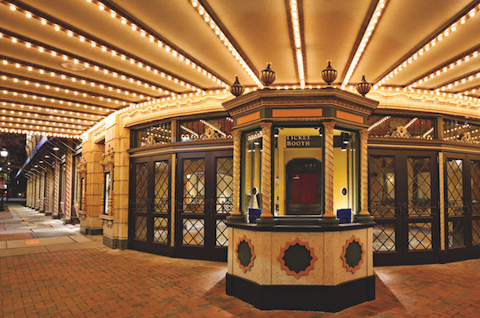The Richmond CenterStage opened in 1928 in the Virginia capital as a grand movie palace named Loew’s Theatre. It was reinvented in 1983 as a performing arts center known as Carpenter Theatre and hobbled along until 2004, when the crumbling venue was mercifully shuttered. There were plans for a comprehensive historic restoration but the funding never materialized.
The complex was finally started on its path toward restoration in 2007, when the Richmond CenterStage Foundation secured the $62.2 million necessary to finance the rehab.
With the Building Team of Wilson Butler Architects and Gilbane/Christman (CM) at the helm, the 148,245-sf historic theater wasn’t simply restored: It was reimagined, enlarged, and upgraded. The new 179,000-sf complex became home to four venues:
• Carpenter Theatre: the fully restored, original 1,760-seat auditorium with enlarged stage and an expanded lobby area.
• Gottwald Playhouse: a 200-seat black box theater.
• Genworth BrightLights Education Center: a training space for aspiring thespians.
• Rhythm Hall: a multipurpose venue.
The building’s extra square footage came from annexing the former six-story Thalhimers Department Store (circa 1939) adjacent to the theater, demolishing parts of the building, and gutting the remainder. The former retail space was transformed into the additional performance and education venues, offices, dressing rooms, and other support spaces.
The conjoined buildings featured a variety of exterior materials, notably brick, terra cotta, and limestone, all in need of attention. The façades were repaired, two new curtain walls were installed in portions of the complex, and new windows and storefront systems were added along one side. Inside, modern acoustical, lighting, rigging, and building system improvements were installed.
The project reopened in September 2009 and became what Walker C. Johnson, FAIA, principal at Johnson Lasky Architects, Chicago, and honorary chair of BD+C’s Reconstruction Awards panel, called “a real sparkler in downtown Richmond.” BD+C
PROJECT SUMMARY
Building Team
Submitting firm: Gilbane/Christman (CM)
Owner/developer: City of Richmond
Architect: Wilson Butler Architects
MEP engineer: Girard Engineering
Structural engineer: Dunbar, Milby, Williams, Pittman and Vaughan
General Information
Size: 179,000 gsf
Construction cost: $62.2 million
Construction period: June 2007 to September 2009
Delivery method: CM at risk
Related Stories
Greenbuild Report | Nov 30, 2015
10 megatrends shaping the future of green building
Increased competition among green building rating systems, the rise of net-zero buildings, and a sharper focus on existing structures are among the trends that will drive sustainability through 2020, according to author and green building expert Jerry Yudelson.
Contractors | Nov 24, 2015
FMI survey: Millennials in construction get a bad rap, tend to be loyal, hard-working
While the stigma exists that Millennials are entitled, disloyal, and lazy, it appears that this is not true, according to a new report from FMI.
Cultural Facilities | Nov 23, 2015
BIG plans for Pittsburgh: Bjarke Ingels’ Lower Hill District master plan evokes hilly topography
Paths will be carved to create a dialogue between Pittsburgh’s urbanscape and its hilly surroundings.
Architects | Nov 23, 2015
Dewberry acquires Houston’s Wilson Architectural Group
Now known as Dewberry | Wilson, the firm will have access to more MEP, technology design, site/civil, and land development capabilities.
Architects | Nov 19, 2015
Book helps prevent new architecture students from making common mistakes
Written by Iain Jackson, "The Architecture School Survival Guide" covers both broad designing ideas and specific architecture tips.
Architects | Nov 18, 2015
AIA: Demand for design services still up for the year
October's ABI score was 53.1, down slightly from the mark of 53.7 in September. This still reflects an increase in design services, as any score above 50 indicates an increase in billings.
Architects | Nov 16, 2015
Croatia's 'sea organ' lets the ocean make music
Visitors to the shores of the Adriatic Sea in Zadar, Croatia, can hear the sounds of the ocean in an entirely different way. There, when the waves hit the coast, they make music—literally.
Architects | Nov 16, 2015
Perkins Eastman, ForrestPerkins combine practices
The combined international firm will total almost 1,000 employees.
Architects | Nov 10, 2015
AIA releases nine new contract documents
Include six new forms for design-build projects.
Architects | Nov 9, 2015
Perkins+Will acquires London-based Portland Design Associates
The firms will work together to offer “future-proofing” insights to clients.

















